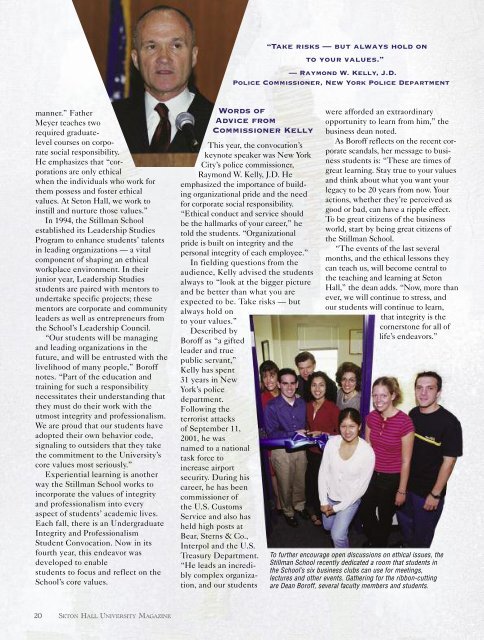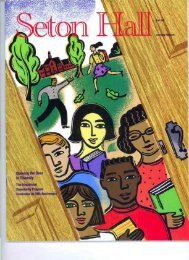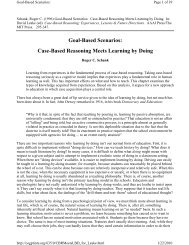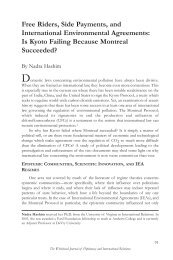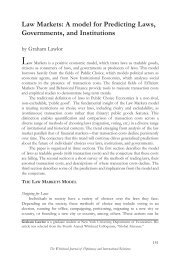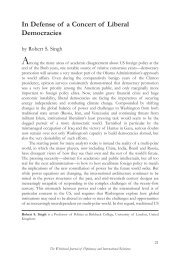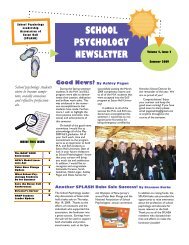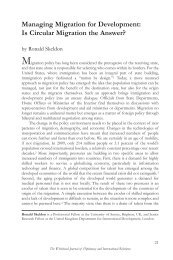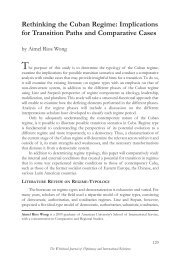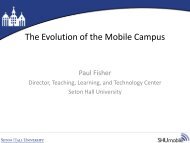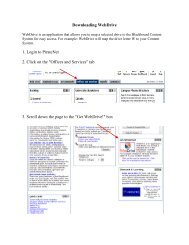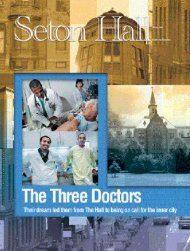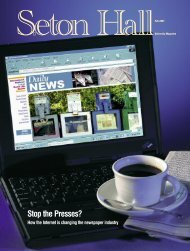Seton Hall Magazine, Winter 2003 - Seton Hall University
Seton Hall Magazine, Winter 2003 - Seton Hall University
Seton Hall Magazine, Winter 2003 - Seton Hall University
Create successful ePaper yourself
Turn your PDF publications into a flip-book with our unique Google optimized e-Paper software.
manner.” Father<br />
Meyer teaches two<br />
required graduatelevel<br />
courses on corporate<br />
social responsibility.<br />
He emphasizes that “corporations<br />
are only ethical<br />
when the individuals who work for<br />
them possess and foster ethical<br />
values. At <strong>Seton</strong> <strong>Hall</strong>, we work to<br />
instill and nurture those values.”<br />
In 1994, the Stillman School<br />
established its Leadership Studies<br />
Program to enhance students’ talents<br />
in leading organizations — a vital<br />
component of shaping an ethical<br />
workplace environment. In their<br />
junior year, Leadership Studies<br />
students are paired with mentors to<br />
undertake specific projects; these<br />
mentors are corporate and community<br />
leaders as well as entrepreneurs from<br />
the School’s Leadership Council.<br />
“Our students will be managing<br />
and leading organizations in the<br />
future, and will be entrusted with the<br />
livelihood of many people,” Boroff<br />
notes. “Part of the education and<br />
training for such a responsibility<br />
necessitates their understanding that<br />
they must do their work with the<br />
utmost integrity and professionalism.<br />
We are proud that our students have<br />
adopted their own behavior code,<br />
signaling to outsiders that they take<br />
the commitment to the <strong>University</strong>’s<br />
core values most seriously.”<br />
Experiential learning is another<br />
way the Stillman School works to<br />
incorporate the values of integrity<br />
and professionalism into every<br />
aspect of students’ academic lives.<br />
Each fall, there is an Undergraduate<br />
Integrity and Professionalism<br />
Student Convocation. Now in its<br />
fourth year, this endeavor was<br />
developed to enable<br />
students to focus and reflect on the<br />
School’s core values.<br />
20 SETON HALL UNIVERSITY MAGAZINE<br />
Words of<br />
Advice from<br />
Commissioner Kelly<br />
This year, the convocation’s<br />
keynote speaker was New York<br />
City’s police commissioner,<br />
Raymond W. Kelly, J.D. He<br />
emphasized the importance of building<br />
organizational pride and the need<br />
for corporate social responsibility.<br />
“Ethical conduct and service should<br />
be the hallmarks of your career,” he<br />
told the students. “Organizational<br />
pride is built on integrity and the<br />
personal integrity of each employee.”<br />
In fielding questions from the<br />
audience, Kelly advised the students<br />
always to “look at the bigger picture<br />
and be better than what you are<br />
expected to be. Take risks — but<br />
always hold on<br />
to your values.”<br />
Described by<br />
Boroff as “a gifted<br />
leader and true<br />
public servant,”<br />
Kelly has spent<br />
31 years in New<br />
York’s police<br />
department.<br />
Following the<br />
terrorist attacks<br />
of September 11,<br />
2001, he was<br />
named to a national<br />
task force to<br />
increase airport<br />
security. During his<br />
career, he has been<br />
commissioner of<br />
the U.S. Customs<br />
Service and also has<br />
held high posts at<br />
Bear, Sterns & Co.,<br />
Interpol and the U.S.<br />
Treasury Department.<br />
“He leads an incredibly<br />
complex organization,<br />
and our students<br />
“Take risks — but always hold on<br />
to your values.”<br />
— Raymond W. Kelly, J.D.<br />
Police Commissioner, New York Police Department<br />
were afforded an extraordinary<br />
opportunity to learn from him,” the<br />
business dean noted.<br />
As Boroff reflects on the recent corporate<br />
scandals, her message to business<br />
students is: “These are times of<br />
great learning. Stay true to your values<br />
and think about what you want your<br />
legacy to be 20 years from now. Your<br />
actions, whether they’re perceived as<br />
good or bad, can have a ripple effect.<br />
To be great citizens of the business<br />
world, start by being great citizens of<br />
the Stillman School.<br />
“The events of the last several<br />
months, and the ethical lessons they<br />
can teach us, will become central to<br />
the teaching and learning at <strong>Seton</strong><br />
<strong>Hall</strong>,” the dean adds. “Now, more than<br />
ever, we will continue to stress, and<br />
our students will continue to learn,<br />
that integrity is the<br />
cornerstone for all of<br />
life’s endeavors.”<br />
To further encourage open discussions on ethical issues, the<br />
Stillman School recently dedicated a room that students in<br />
the School’s six business clubs can use for meetings,<br />
lectures and other events. Gathering for the ribbon-cutting<br />
are Dean Boroff, several faculty members and students.


